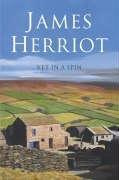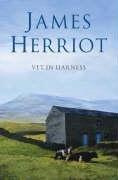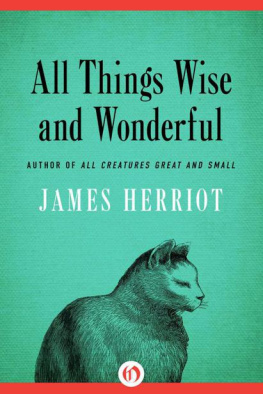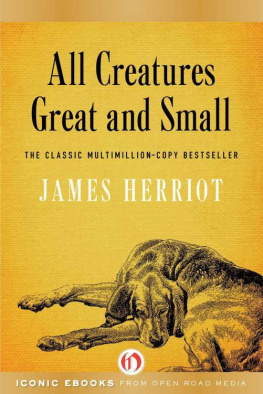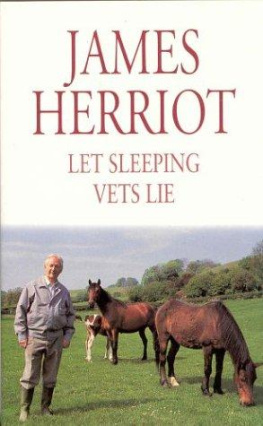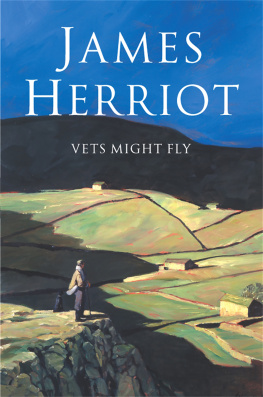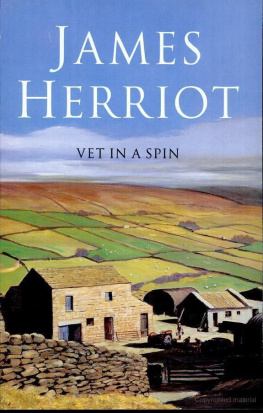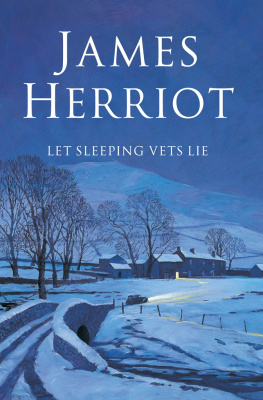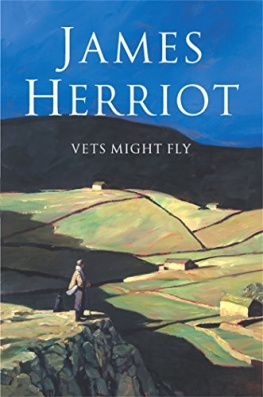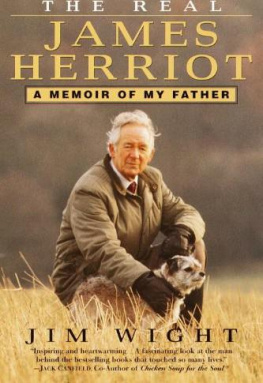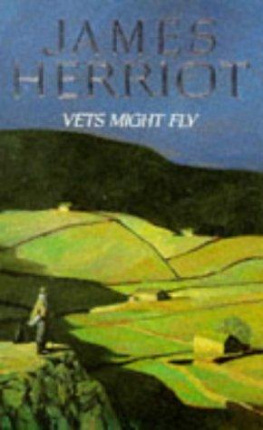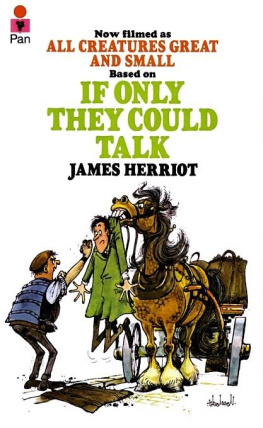- when he spoke again.
.....~b about Paul Cotter ell, wasn't it?"
..... 'o you mean?"
.....conjurebt you'd have heard," he said.
"He's dead."
"Dead!" I stared at him stupidly.
"How... what...?"
"Pound 'im this morn in'. He did away with 'is self."
I leaned with both hands on the desk.
"Do you mean... suicide?"
"Aye, that's what they say. Took a lot o' pills. It's all ower t'town' I found myself hunching over the day book, sightlessly scanning the list of calls while the farmer's voice seemed to come from far away.
"It's a bad job, right enough. He were a nice feller. Reckon everybody liked 'im."
Later that day I was passing Paul's lodgings when I saw his landlady, Mrs Clayton' in the doorway. I pulled up and got out of the car.
"Mrs Clayton," I said.
"I still can't believe this."
"Nor can I, Mr Herriot, it's terrible." Her face was pale, her eyes red.
"He was with me six years, you know he was like a son."
"But why on earth...?"
"Oh, it was rosin' his dog that did it. He just couldn't stand it."
A great wave of misery rose and engulfed me and she put her hand on my arm.
"Don't look like that, Mr Herriot. It wasn't your fault. Paul told me all about it and nobody could have saved Theo. People die of that, never mind dogs."
I nodded dumbly and she went on.
"But I'll tell you something in confidence, Mr Herriot. Paul wasn't able to stand things like you or me. It was the way he was made you see he suffered from depression."
"Depression! Paul...?"
"Oh yes, he's been under the doctor for a long time and takin' pills regular.
He all us put a brave face on, but he's had nervous trouble off and on for years."
"Nervous trouble ... I'd never have dreamed..."
"No, nobody would, but that's how it was. He had an unhappy childhood from what I made out. Maybe that's why he was so fond of his dog. He got too attached to him, really."
"Yes ... yes..."
She took out a screwed up handkerchief and blew her nose.
"Well, as I said, the poor lad had a rough time most of his life, but he was brave."
There didn't seem anything else to say. I drove away out of the town and the calm green hills offered a quiet contrast to the turmoil which can fill a man's mind. So much for Herriot as a judge of character. I couldn't have been more wrong, but Paul had fought his secret battle with a courage which had deceived everybody.
I reflected on the object lesson which I thought he had given me, but in fact it was a lesson of another kind and one which I have never forgotten; that there are countless people like Paul who are not what they seem.
:'3'::~ !
v~z zn a opzn Chapter Thirteen The shock of Paul Cotter ell's death stayed with me for a long time, and in fact I know I have never quite got over it because even now when the company in the bar of the Drovers' has changed and I am one of the few old faces left from~ thirty-five years ago I can still see the jaunty figure on the corner stool and the~] bushy face peeping from beneath. ~ It was the kind of experience I didn't want repeated in my lifetime. uncannily, I ran into the same sort of thing almost immediately afterwards.
It couldn't have been more than a week after Paul's funeral that Andre Vine brought his fox terrier to the surgery.
I put the little dog on the table and examined each of his eyes carefully iD."
turn.
"I'm afraid he's get ting worse," I said. ~ Without warning the man slumped across the table and buried his face in his hands. ~ ~ ~ hand on his shoulder.
"What is it, Andrew? What on earth's the :: At first he did not answer but stayed there, huddled grotesquely by the side;~ of his dog as great sobs shook his body. ~) When he spoke at last it was into his hands and his voice was hoarse and'~ .
desperate.
"I can't stand it! If Digger goes blind I'll kill myself!" ~ ,i, I looked down at the bowed head in horrified disbelief. It couldn't be happening: again. Not so soon after Paul. And yet there were similarities. Andrew was$^ another bachelor in his thirties and the terrier was his constant companion.
Hi!~lived in lodgings and appeared to have no worries though he was a shy, diffident man with a fragile look about his tall stoop in, frame and pallid face. :~ He had first consulted me about Digger several months ago. - .ifi~.
"I call him that because he's dug large holes in the garden ever since his -':~ puppy days," he said with a half smile, loo king at me almost apprehensively' :~ from large dark eyes..
I laughed.
"I hope you haven't brought him to me to cure that, because I've
never read anything in the books about it." ~. ~: "No, no, it's about something else his eyes. And he's had that trouble sine.
~~ he was a pup, too."
"Really? Tell me."
~UL Illy matter ?"
"Well, when I first got him he had sort of mastery eyes, but the breeder : r he'd probably just got some irritant in them and it would soon clear up. And:: in fact it did. But he's never been quite right. He al ways seems to have a littl~9 discomfort in his eyes."
"How do you mean?"
"He rubs the side of his face along the carpet and he blinks in bright ligh~ "I see." I pulled the little animal's face round towards me and looked intentl at the eyelids. My mind had been busy as he spoke and I was fairly sure I should find either entropion (inversion of the eyelids) or distichiasis (an e~ row of lashes rubbing against the eyeball) but there was no sign of either~ (,........
/o) Surface of the cornea, too, looked normal, except perhaps that the deeper structure of lens and iris were not as easy to define as usual.
I moved over to a cupboard for the ophthalmoscope.
"How old is he now?"
"About a year."
"So he's had this for about ten months?"
"Yes, about that. But it varies a lot. Most of the time he seems normal then there are days when he goes and lies in his basket with his eyes half closed and you can tell there's something wrong. Not pain, really. More like discomfort, as I said."
I nodded and hoped I was loo king wise but none of this added up to anything familiar. I switched on the little light on the ophthalmoscope and peered into the depths of that most magical and delicate of all organs, down through the lens to the brilliant tapestry of the retina with its optic papilla and branching blood vessels. I couldn't find a thing wrong.
"Does he still dig holes?" I asked. When baffled I often snatch at straws and I wondered if the dog was suffering from a soil irritation.
Andrew shook his head.
"No, very seldom now, and anyway, his bad days are never associated with his digging."
"Is that so?" I rubbed my chin. The man was obviously ahead of me with his thinking and I had an uncomfortable feeling of bewilderment. People were al ways bringing their dogs in with 'bad eyes' and there was invariably something to be seen, some cause to be found.
"And would you say that this was one of his bad days?"
"Well I thought so this morning, but he seems a bit better now. Still, he's a bit blinky, don't you think?"
"Yes... maybe so." Digger did appear to be reluctant to open his eyes fully to the sunshine streaming through the surgery window. And occasionally he kept them closed for a second or two as though he wasn't very happy. But damn it, nothing gave me the slightest clue.
I didn't tell the owner that I hadn't the faintest idea what was wrong with his dog. Such remarks do not inspire confidence. Instead, I took refuge in businesslike activity.
"I'm going to give you some lotion," I said briskly.
"Put a few drops into his eyes three times daily. And let me know how he goes on. It's possible he has some long-stan ding infection in there."
I handed over a bottle of 2% boric acid solution and patted Digger's head.
Next page
